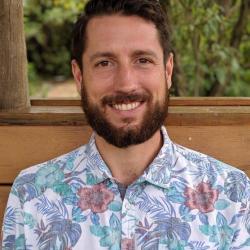Jain Philosophy and Professional Ethics
Course Intro Video


Jain Philosophy and Professional Ethics
Course 1013
This course begins in the first lesson by considering the limits of professional and philosophical ethics education. In the second lesson, it considers texts and concepts in Jainism and Jain ethics insofar as they serve to facilitate reflection on these limits, fostering dialogue on foundational issues in professional ethics. In the final four lessons, Jain four major components of the Jain ethical outlook are explored in relation to professional ethics. In turn, it considers the relationship between self-perception and ethical outlook, the necessity of harm or violence, the validity of anthropocentrism, the moral tenability of the pursuit of affluence, and the need for a balance between personal and professional morality. Rather than proposing a Jain-inspired system of professional ethics for students to consider adopting, this course aims to provide opportunities for
students to reflect upon and adjust the foundations of their professional ethical outlook in conversation with plausible Jain ideas and arguments about how we ought to think, speak, and act.
 Professional Ethics
Professional Ethics
 Benjamin Zenk, PhD
Benjamin Zenk, PhD
students to reflect upon and adjust the foundations of their professional ethical outlook in conversation with plausible Jain ideas and arguments about how we ought to think, speak, and act.
Course Length
6 hours Self-Study (Professor available by appointment in office hours)Learning Area
 Professional Ethics
Professional Ethics Instructor
 Benjamin Zenk, PhD
Benjamin Zenk, PhD
Dr. Benjamin Zenk is Instructor of Management in the College of Business and Economics at the University of Hawaii at Hilo in the United States. There, he teaches critical thinking, business ethics, environmental ethics, and introductory business. Dr. Zenk also works with the university's department of philosophy where he has taught intro to philosophy, ethics, reasoning, symbolic logic, histories of Indian and Buddhist philosophy, and comparative philosophy. He received his PhD in philosophy from the University Hawaii at Manoa in 2018 on the topic of cross-cultural philosophical disagreement. Prior to this, he received an M.A. in philosophy from the University of Hawaii at Manoa and a bachelor’s degree in philosophy from Loyola Marymount University (LMU). Dr. Zenk utilizes a broad array of cross-cultural and interdisciplinary materials in his business and management courses, stemming from his studies of world philosophy, logic, and ethics, as well as both German and Sanskrit language and literature. His work has led to many months of language and cultural research and study in both Germany and India.
Enrollment Options
14-DAY FREE TRIAL
- Free, unlimited access to our self-paced courses for 14-days.
- Already used your free trial? Enroll in our Monthly or Annual Membership options at anytime and continue learning immediately!
MONTHLY MEMBERSHIP
- $45 USD / Month
- Immediate access to course #### | Name.
- Unlimited access to our live and self-paced courses for one month, with month-to-month auto rollover.
- Excludes graduate seminars and language courses.
